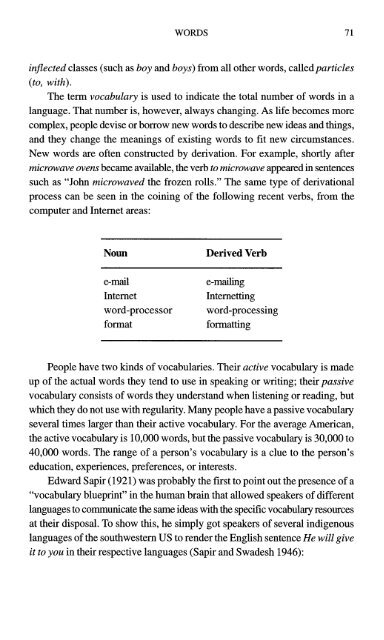A Basic Course in Anthropological Linguistics (Studies in Linguistic ...
A Basic Course in Anthropological Linguistics (Studies in Linguistic ...
A Basic Course in Anthropological Linguistics (Studies in Linguistic ...
Create successful ePaper yourself
Turn your PDF publications into a flip-book with our unique Google optimized e-Paper software.
WORDS 71<br />
<strong>in</strong>flected classes (such as boy and boys) from all other words, calledparticles<br />
(to, with).<br />
The term vocabulary is used to <strong>in</strong>dicate the total number of words <strong>in</strong> a<br />
language. That number is, however, always chang<strong>in</strong>g. As life becomes more<br />
complex, people devise or borrow new words to describe new ideas and th<strong>in</strong>gs,<br />
and they change the mean<strong>in</strong>gs of exist<strong>in</strong>g words to fit new circumstances.<br />
New words are often constructed by derivation. For example, shortly after<br />
microwave ovens became available, the verb to microwave appeared <strong>in</strong> sentences<br />
such as “John microwaved the frozen rolls.” The same type of derivational<br />
process can be seen <strong>in</strong> the co<strong>in</strong><strong>in</strong>g of the follow<strong>in</strong>g recent verbs, from the<br />
computer and Internet areas:<br />
Noun Derived Verb<br />
e-mail e-mail<strong>in</strong>g<br />
Internet Internett<strong>in</strong>g<br />
word-processor word-process<strong>in</strong>g<br />
format formatt<strong>in</strong>g<br />
People have two k<strong>in</strong>ds of vocabularies. Their active vocabulary is made<br />
up of the actual words they tend to use <strong>in</strong> speak<strong>in</strong>g or writ<strong>in</strong>g; their passive<br />
vocabulary consists of words they understand when listen<strong>in</strong>g or read<strong>in</strong>g, but<br />
which they do not use with regularity. Many people have a passive vocabulary<br />
several times larger than their active vocabulary. For the average American,<br />
the active vocabulary is 10,000 words, but the passive vocabulary is 30,000 to<br />
40,000 words. The range of a person’s vocabulary is a clue to the person’s<br />
education, experiences, preferences, or <strong>in</strong>terests.<br />
Edward Sapir (1921) was probably the frrst to po<strong>in</strong>t out the presence of a<br />
“vocabulary bluepr<strong>in</strong>t” <strong>in</strong> the human bra<strong>in</strong> that allowed speakers of different<br />
languages to communicate the same ideas with the specific vocabulary resources<br />
at their disposal. To show this, he simply got speakers of several <strong>in</strong>digenous<br />
languages of the southwestern US to render the English sentence He will give<br />
it to you <strong>in</strong> their respective languages (Sapir and Swadesh 1946):






